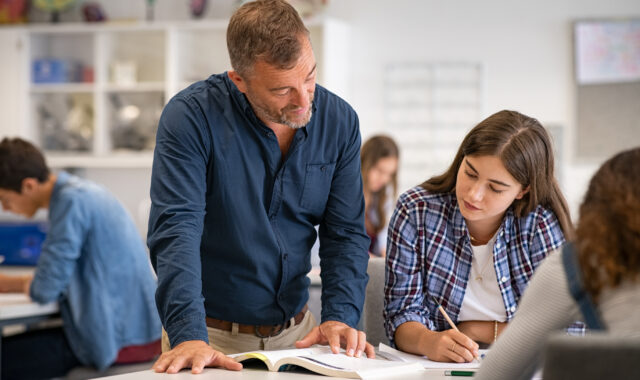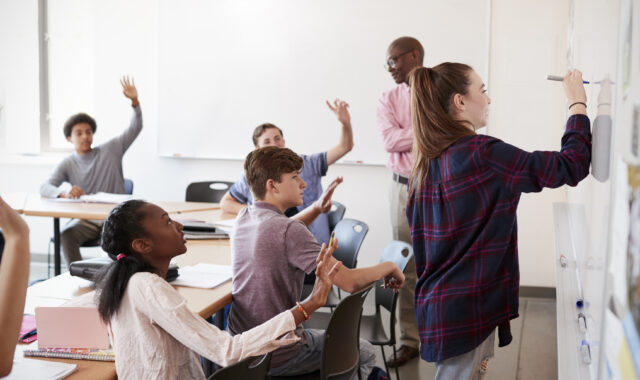I entered the teaching profession as an enthusiastic—if admittedly naive—twenty-something, brimming with idealism and eager to change the world. If you’d asked me back then what makes a good teacher, I would have confidently replied that solid subject knowledge and a genuine passion for learning were all that was required to be on the fast track to a national teaching award. Let’s just say the rose-tinted glasses didn’t survive the first full week.
The honeymoon period ended swiftly—second lesson on the first day, to be precise. Within minutes of starting an ‘engaging and thought-provoking discussion’, one student was half-asleep, another was asking if it was nearly lunchtime, and the rest were deep into a debate on the best pizza toppings! As I looked down at my beautifully colour-coded lesson plan, I felt deflated. How had things gone so spectacularly off-script? I’d imagined a sea of enthusiastic learners, deeply engrossed in meaningful dialogue—maybe even applauding at the end. Instead, I got a paper plane to the back of the head and a heated debate about who stole someone else’s pen.
Looking back, I can smile at those early lessons. I thought I was there to instruct and guide others, but I ended up learning just as much, if not more, along the way. The skills that make a good teacher aren’t mastered overnight but are developed over time through experience, reflection and a fair share of trial and error.
There’s no denying it, teaching is a demanding profession. Yet, while some teachers seem to thrive—consistently engaging students, managing challenges, and building strong relationships—others find themselves struggling to connect and stay afloat. So, what makes the difference? This blog post explores the question ‘What makes a good teacher?’ and the key qualities that help educators not just survive, but truly succeed in the classroom.
Passion for teaching
Although it may seem obvious, a good teacher is driven by a genuine passion for both their subject and the art of teaching itself. This enthusiasm is often contagious, helping to create a positive and engaging classroom environment.
We can all relate to this. When we’re truly excited about what we’re teaching, our energy becomes infectious, and suddenly the whole class is more engaged and eager to learn. It’s in those moments that teaching feels effortless and learning feels fun.

Secure subject knowledge
A strong grasp of subject knowledge is undoubtedly one of the cornerstones of effective teaching. A key quality of a good teacher is expertise in their subject, enabling them to provide accurate, clear, and up-to-date information to their students.
We’re always at our best when teaching a topic we know thoroughly. We can explain ideas clearly and confidently and address common misconceptions early on. We’ve also had those lessons when we’ve been met with a sea of blank stares. Or when impromptu questions left us shaking in our boots. Good preparation and planning are key to delivering an effective lesson, as is a commitment to learning and expanding our own skill set.
Strong communication skills
Even the most knowledgeable teacher can struggle to be effective without clear communication skills. Being able to break down complex ideas into simple, understandable terms is key. It means using language that connects with your students and adjusting your explanations based on their level of understanding. It’s not just what you say, but also how well you listen and respond with constructive feedback. When done well, clear communication builds trust, encourages student participation, and creates a positive, supportive learning environment.
Have you ever been in a lesson where you struggled to convey concepts effectively, leaving both you and your students frustrated? Yes, we’ve all been there—too many times than we care to admit. The good news is that communication skills can be developed and improved over time with training and practice. Most teachers have natural communication skills, but what sets a good teacher apart is their ability to continually refine those skills to meet the needs of every student.
Excellent planning skills
Good planning is the foundation of effective teaching. It gives lessons structure, ensures key objectives are met, and helps manage time wisely. What makes a good teacher is thoughtful and intentional lesson planning; well-defined expectations are set, and accurate records to support student learning are maintained.
Effective planning isn’t about scripting every moment; it’s about having a clear roadmap that helps us stay focused and navigate challenges as they arise.

Team player
Great teaching isn’t a solo act—it’s about working together as a team to create real impact in schools. From collaborating with fellow teachers to partnering with support staff and families, every member plays a vital role in shaping students’ success. When teachers share ideas, support one another, and communicate openly, it builds a stronger, more cohesive learning community.
Remember, the best outcomes happen when we lean on each other and work towards a common goal. Teaching is no easy task, but when we come together to collaborate and support one another, we build a positive environment that benefits both students and educators alike.
Creativity
Creative teaching allows for flexibility and keeps learning fresh and exciting. It gives teachers the freedom to try new approaches, tailor lessons to what resonates with their students, and bring energy into the classroom. It makes the learning experience more dynamic and students more likely to stay engaged and motivated.
By weaving creativity into your teaching, you’ll not only keep your lessons interesting but also help students develop critical thinking and problem-solving skills they’ll carry with them beyond the classroom.
Want to bring more creativity into your lessons? Try incorporating open-ended tasks, project-based learning, or real-world scenarios that encourage students to think in new and different ways. Use storytelling, role-play, or visuals to make abstract concepts more accessible and engaging. And don’t be afraid to experiment—some of the most memorable lessons happen when you step outside the usual routine and let curiosity lead the way.
Good classroom management
Effective classroom management is an integral quality of a good teacher. It helps create a learning space where students feel safe, respected, and ready to engage. By establishing clear expectations and consistent routines, teachers can minimise disruptions and maximise learning time.

Classroom management can feel like a juggling act at times, but it’s one of the most important tools in a teacher’s toolkit. When we have a clear plan and consistent routines, our students know what’s expected and feel more comfortable taking risks and participating. Yes, there will be days when things don’t go as planned, but that’s just part of the job.
Bear in mind that good classroom management skills don’t happen overnight. They evolve over time through experience and reflection.
Digital literacy
In today’s classrooms, digital literacy is more important than ever. It’s not just about using technology—it’s about teaching students how to critically evaluate information, communicate responsibly online, and use digital tools effectively to support their learning.
Step out of your comfort zone and challenge yourself to try new digital tools and techniques. Don’t be intimidated—many of these skills are easier to learn than you might think, and there are plenty of helpful tutorials on YouTube and other platforms. Keep in mind that developing your digital skills is an ongoing journey that evolves alongside your teaching practice.
Adaptability
Every day in the classroom comes with its own set of challenges and surprises. A lesson isn’t going to plan, students aren’t engaging, or an unexpected distraction throws things off track. In moments like this, adaptability is key. What makes a good teacher is someone who knows how to pivot, calmly responding to what’s happening in real time to keep the momentum going.
Some of our best moments in teaching happen when we let go of the reins and trust the flow of the classroom. It’s in those spontaneous, unplanned interactions that real learning and connection often take place.

High expectations for students
The hallmark of a good teacher is their ability to set high expectations while offering the support students need to reach them. They create a classroom culture where effort, growth and resilience are the norm. It’s not about demanding perfection, but about encouraging students to aim higher and trust in their ability to succeed.
When we set high expectations and truly believe our students can meet them, something shifts. We’ve all seen it—that moment when a student surprises themselves by rising to a challenge they didn’t think they could handle. Maybe it’s a student who finally cracks a concept they’ve struggled with for weeks, or someone who used to shy away from participation suddenly volunteers to share their thinking with the whole class. When we consistently show our students that we believe in their ability to succeed, they begin to believe it too, and that belief can be the spark that changes everything.
Patience
Patience is one of the most important qualities a teacher can have. Every student learns at their own pace, and progress doesn’t happen overnight. Being patient means giving students the time and space they need to grasp new concepts, make mistakes, and build confidence without feeling rushed or judged.
In teaching, our patience is constantly tested. We’ve all experienced moments when progress feels slow, whether it’s a student struggling to understand a topic or a class that just isn’t clicking that day. Perhaps it’s dealing with a challenging parent or colleague. At times like this, it can be difficult to stay calm and focused, but it’s precisely in these moments that patience becomes our greatest asset.
Empathy
Empathy is at the heart of effective teaching. It’s about understanding students’ feelings and perspectives, recognising their struggles, and responding with compassion. A good teacher uses empathy to build trust and create a safe, supportive environment where students feel heard and valued.

As teachers, we’ve all had moments when a student’s behaviour or attitude seems off. Maybe they were unusually quiet, or their grades suddenly dropped. Taking the time to listen and try to understand what’s going on beyond the surface can make all the difference. Sometimes, all a student needs is to feel that someone cares and sees their struggles. These moments remind us that teaching isn’t just about academic content but about nurturing the whole student.
Respect
When respect is at the centre of the classroom, it creates an environment where students feel valued and heard. This sense of mutual respect encourages open communication, collaboration, and a willingness to take risks—key ingredients for impactful learning. Students are more engaged, motivated, and confident when they know their thoughts and feelings matter.
Building respect in your classroom starts with modelling it yourself. When you treat students with kindness, listen actively, and value their opinions, they’re more likely to do the same. Setting clear expectations around respectful behaviour early on helps establish a positive tone. Encourage students to celebrate each other’s differences and practice empathy by understanding diverse perspectives.
Create a sense of community
Teaching isn’t all about paperwork, rules, and to-do lists. One of the most important qualities of a good teacher is the ability to build strong, meaningful relationships with students. These connections create trust, boost engagement, and help students feel supported in their learning journey.
Creating a strong sense of classroom community starts with the small things like learning students’ names, greeting them warmly, and making them feel seen and heard. Encourage collaboration through group work, give students a voice in their learning, and celebrate their efforts. Get to know your students as individuals. What do they enjoy? What challenges them?

Sense of humour
A sense of humour is one of the most underrated tools in a teacher’s toolkit, but it can go a long way in the classroom. It helps build rapport, diffuses tricky situations, and makes the classroom a more enjoyable place to be.
Humour shows students that you’re human too, and that learning doesn’t always have to be serious to be meaningful. But it also helps you stay grounded and keep a sense of perspective when you’re feeling overwhelmed. We’ve all experienced days when we feel like we’re running on empty; when we’re desperately trying to keep our heads above water. Being able to laugh at ourselves and not take things too seriously during those times can be a powerful way to lighten the load and keep moving forward.
The above list of qualities that make a good teacher is far from complete or exhaustive. Nor is it meant to be a tick list but rather a gentle reminder of the many different ways teachers can make a meaningful impact. Each of us has our own strengths, and there’s no one-size-fits-all formula.
Some qualities come naturally, while others develop over time through experience, reflection, and a willingness to grow. What makes a good teacher isn’t perfection but the commitment to keep learning and showing up for your students each day.







Comments